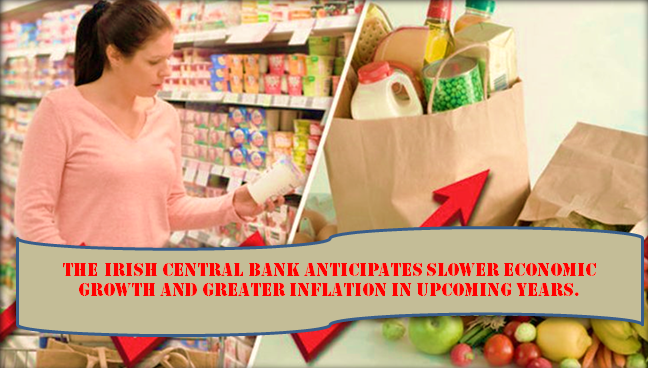DUBLIN: Ireland’s central bank raised its inflation prediction for 2023 while lowering its economic growth forecast for the third quarter in a row, but expects the pressure on disposable incomes to diminish in the second half of the coming year. The bank still expects modified domestic demand (MDD), its preferred measure of economic growth, to grow by 2.3% next year and has raised its prediction for this year to 6.4% due to a big, probable one-time surge in investment in the first half.
Furthermore, three months ago, it forecasted MDD growth of 4.2% for 2023, before a longer period of price pressure from rising energy prices caused it to raise its inflation projection for next year to 6.3%, up from 4.2% earlier. The bank stated that with inflation presently predicted at 8.6%, it increased its 2022 projection to 8% from 7.8%, stating that there are still upside risks to the price outlook and downside risks to the growth forecast.
The central bank stated in its quarterly bulletin that “these trends will lower the forecast rate of economic expansion this winter and into next year as consumers and corporations postpone less-essential expenditure and investment in the face of uncertainty and more limited real earnings.” Its inflation estimates were lower than those released last week by Ireland’s finance minister. The finance ministry was similarly more negative about the economy’s prospects, forecasting MDD growth of only 1.2% next year.
According to the central bank, the effect of the oil crisis will likely reduce average real family income by 3.3% this year, the greatest decrease in more than a decade. Wages are predicted to grow by 5.8% in 2023, beginning to soften the impact slightly in the second half of next year, according to the report.
Regarding the recent economic turmoil in neighboring Britain, the central bank stated that a less favorable growth path there would have only a marginally negative impact on Ireland’s outlook, whereas a larger appreciation of the euro relative to sterling would lead to lower inflation, given the level of imports from Britain.
Irish Samachar English News
Kindly click the link below to join WhatsApp group chat to get important news and breaking news from Irish Samachar: https://chat.whatsapp.com/KBqVjwrzvrb386McEnoyZ5


Comments are closed.